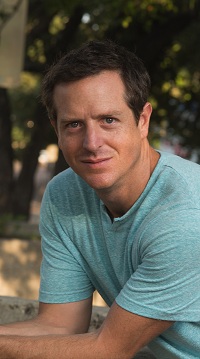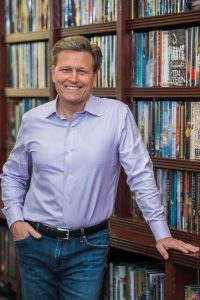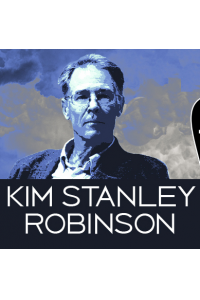Hugh Howey: Artisanal Publishing
 Hugh Crocker Howey was born June 23, 1975 near Charlotte NC. He moved to Charleston SC after high school, where he worked and attended college. He spent several years traveling the world working on boats, and worked as a roofer and in a bookstore before becoming a full-time writer.
Hugh Crocker Howey was born June 23, 1975 near Charlotte NC. He moved to Charleston SC after high school, where he worked and attended college. He spent several years traveling the world working on boats, and worked as a roofer and in a bookstore before becoming a full-time writer.
Howey began publishing in the small press with the first book in the Molly Fyde/Bern Saga: Molly Fyde and the Parsona Rescue (2009). He self-published sequels Molly Fyde and the Land of Light (2009), Molly Fyde and the Blood of Billions (2010), and Molly Fyde and the Fight for Peace (2010). He followed that up with standalone SF novel Half Way Home (2010).
In 2011, Howey self-published standalone novelette ‘‘The Plagiarist’’, followed by novelette ‘‘Wool’’, the first in his bestselling Silo series of postapocalyptic SF stories. He collected the first five stories in Wool Omnibus (2012), followed by sequels Shift (2012) and Dust (2013). In 2013, Howey signed a deal with Simon & Schuster to publish the Silo series in print, while retaining digital rights himself. He also self-published a mainstream novel, The Hurricane (2011), and zombie novel I, Zombie (2012).
Howey lives in Jupiter FL with his wife.
Excerpts from the interview:
‘‘Writing was always a dream, but I would write three chapters in a novel and not know what to do next and then give up or lose confidence. I did that for 20 years. I did a lot of daydreaming and thinking, and I was an avid reader. I wanted to write since I was 12. My first big passion was fantasy, and then, because they shelve the genres in the same aisle, I encountered science fiction and went through a huge phase. It started off with Douglas Adams, Orson Scott Card, Dune…. I got into the Foundation Saga, and just fell in love with these worlds. There was a period of my life where I started losing my sense of mysticism and wanted hard answers for things. I think the big difference between SF and fantasy is, with fantasy, it’s a magical past that never was, and with science fiction, it’s a magical future that just might be. In the SF I like, you can suspend disbelief and think, ‘I’m reading a future history novel.’”
…
 ‘‘I came up with the idea for ‘Wool’ when I was traveling around by boat, visiting Cuba and poor countries in Central America and the islands, Guatemala, and Haiti. There are places out there that could use some help. What I noticed when we would bicycle through those poor neighborhoods is that kids are out playing soccer and laughing. Aren’t they supposed to be miserable? Conditions could be a lot better there; it’s a beautiful country, but people are poor in a lot of ways. There are lots of macro things that could be improved, but on a micro level, people go about their lives, they’re falling in and out of love, they’re laughing over coffees.
‘‘I came up with the idea for ‘Wool’ when I was traveling around by boat, visiting Cuba and poor countries in Central America and the islands, Guatemala, and Haiti. There are places out there that could use some help. What I noticed when we would bicycle through those poor neighborhoods is that kids are out playing soccer and laughing. Aren’t they supposed to be miserable? Conditions could be a lot better there; it’s a beautiful country, but people are poor in a lot of ways. There are lots of macro things that could be improved, but on a micro level, people go about their lives, they’re falling in and out of love, they’re laughing over coffees.
‘‘I got off boats and I was living in Virginia and watching 24-hour news, which I had to stop after a while. I thought, ‘Why would anyone go anywhere if they think the world’s like this?’ It’s nothing but the worst. It’s Syria and Egypt, anything loud and noisy, the Michael Bay producers of news, it’s everything blowing up. What does this do to us, this view of the world? It makes us not want to go out and see the world for ourselves. A lot of my SF comes from current events, and that idea of the people who live in a Plato’s cave of sorts, where they don’t see the forms of things, they just see the shadowy shapes projected on the cave wall. But in this case, the shadowy forms are things with claws, and you’re seeing nothing but nightmares. What does that do to the human psyche?
‘‘There’s a great book, written in the last few years, by Steven Pinker, called The Better Angels of Our Nature. It’s about how the world keeps getting better, and people keep thinking it’s getting worse. The way we relate to the news has something to do with it. ‘A household product is killing your kids: Details at 11.’ So I wrote a story about people who are trapped underground and the only thing they see of the world is that it’s awful, and they’re not allowed to go out and explore it for themselves. At first I thought, ‘They’ll go out and it’ll be great,’ but I started writing, and realized it couldn’t be that easy. I had to weigh the philosophical thing I wanted to say against what makes for an entertaining story.”
…
‘‘If you want to succeed at self-publishing, you have to treat it professionally. There are thousands of people who make a full-time living from writing. That wasn’t true four years ago when I was working in a bookstore, dealing with our visiting writer series and authors coming in – they all had day jobs. These were New York Times bestselling authors. I just had lunch yesterday with a friend of mine who’s making great money, and no one’s heard of him except for his readers. If I told you his name you wouldn’t recognize it, but he is doing better than 90% of the authors on panels at Worldcon. It’s such a crazy time.”
…
‘‘I wrote this article for Salon a while back, where I said the real story of self-publishing is the people you never hear about who are making a full-time living. I have friends that I watched go from publishing their first book, in the past few years, and now they’re making six figures. You’ve never heard their names. I have a friend making six figures a month for the last year plus, you’ve never heard of this guy – his writer name is Joe Nobody. He’s set for life. He’s not a household name. You’ll never see his stuff in a bookstore. His cover art is purposefully bad. He’s writing about survival techniques and he’s marketing to the doomsday-prepper audience. Publishers don’t know about this audience. I didn’t even know until I started following this guy. He’s charging $9.99 for an e-book. Most self-published people aren’t even charging what I’m charging for an e-book. If you saw his covers, you just wouldn’t believe it. It’s fiction, but you learn survival techniques from it. His writing is phenomenal. He’s doing everything correctly.”
…
“If you self-publish, it’s print on demand, it’s e-book, it’s available for the next 75 years of your life. There’s a forum I frequent, and I posted a thread saying, ‘I wonder how long it’s going to be before someone gives up on writing and then their books take off.’ Within a day I had two people respond to that thread saying that’s exactly what happened to them. Instead of the traditional death of a book in a bookstore, their books were still available. We don’t appreciate the change yet. This train’s only been going for three years. In 15 years, people are going to look back and say, ‘Wow, look what this guy’s done, selling five books a week for 15 years.’”





Great interview, Hugh, but you already know that I agree with you, being one of those authors no one has heard of but who makes a living at it. You’re a fantastic spokesman for self-published authors. Thanks!
Indie publishing also allows those of us who prefer to write shorter works (short stories through novellas) to find a welcoming audience, especially in science fiction. That, plus full control of cover art and all other aspects of our creations, makes self publishing a viable option in the 21st century.
20th Century-style publishing was perfect for the 20th century. 😉
One of the things I like most about self-publishing is that it creates a market for collections of previously published short stories, which otherwise have no commercial value. This year, I’ve put together ebook and POD collections of my stories that ran in F&SF, Asimov’s, and other venues . They only sell a few copies a day, but that’s an income stream that didn’t used to exist.
With the impending death of mass market paperbacks, the commercially published single-author collection is no longer viable. But self-published collections, as ebooks and PODs, are a new definition of “money for old rope.”